卓越补习八年级下册英语广州牛津版课文笔记U2
- 格式:doc
- 大小:104.50 KB
- 文档页数:13
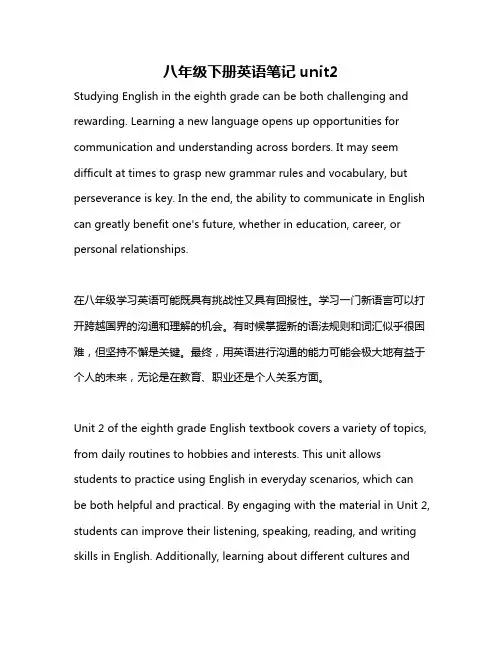
八年级下册英语笔记unit2Studying English in the eighth grade can be both challenging and rewarding. Learning a new language opens up opportunities for communication and understanding across borders. It may seem difficult at times to grasp new grammar rules and vocabulary, but perseverance is key. In the end, the ability to communicate in English can greatly benefit one's future, whether in education, career, or personal relationships.在八年级学习英语可能既具有挑战性又具有回报性。
学习一门新语言可以打开跨越国界的沟通和理解的机会。
有时候掌握新的语法规则和词汇似乎很困难,但坚持不懈是关键。
最终,用英语进行沟通的能力可能会极大地有益于个人的未来,无论是在教育、职业还是个人关系方面。
Unit 2 of the eighth grade English textbook covers a variety of topics, from daily routines to hobbies and interests. This unit allows students to practice using English in everyday scenarios, which can be both helpful and practical. By engaging with the material in Unit 2, students can improve their listening, speaking, reading, and writing skills in English. Additionally, learning about different cultures andcustoms through the unit can broaden one's worldview and enhance cultural awareness.八年级英语教科书的第二单元涵盖了各种主题,从日常生活到爱好和兴趣。
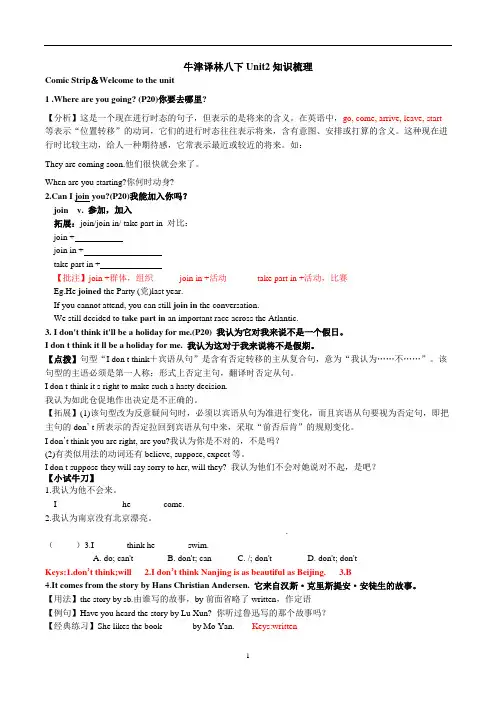
牛津译林八下Unit2知识梳理Comic Strip&Welcome to the unit1 .Where are you going? (P20)你要去哪里?【分析】这是一个现在进行时态的句子,但表示的是将来的含义。
在英语中,go, come, arrive, leave, start 等表示“位置转移”的动词,它们的进行时态往往表示将来,含有意图、安排或打算的含义。
这种现在进行时比较主动,给人一种期待感,它常表示最近或较近的将来。
如:They are coming soon.他们很快就会来了。
When are you starting?你何时动身?2.Can I join you?(P20)我能加入你吗?join v. 参加,加入拓展:join/join in/ take part in 对比:join +join in +take part in +【批注】join +群体,组织join in +活动take part in +活动,比赛Eg.He joined the Party (党)last year.If you cannot attend, you can still join in the conversation.We still decided to take part in an important race across the Atlantic.3. I don't think it'll be a holiday for me.(P20)我认为它对我来说不是一个假日。
I don t think it ll be a holiday for me. 我认为这对于我来说将不是假期。
【点拨】句型“I don t think+宾语从句”是含有否定转移的主从复合句,意为“我认为……不……”。
该句型的主语必须是第一人称;形式上否定主句,翻译时否定从句。
I don t think it s right to make such a hasty decision.我认为如此仓促地作出决定是不正确的。
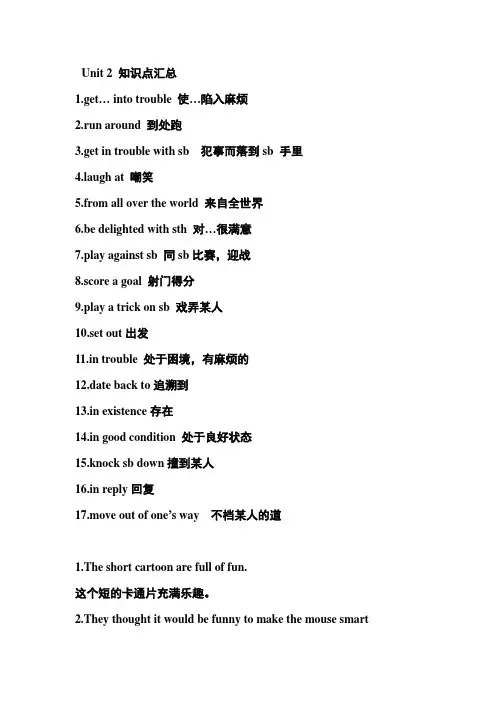
Unit 2 知识点汇总1.get… into trouble 使…陷入麻烦2.run around 到处跑3.get in trouble with sb 犯事而落到sb 手里ugh at 嘲笑5.from all over the world 来自全世界6.be delighted with sth 对…很满意7.play against sb 同sb比赛,迎战8.score a goal 射门得分9.play a trick on sb 戏弄某人10.set out出发11.in trouble 处于困境,有麻烦的12.date back to追溯到13.in existence存在14.in good condition 处于良好状态15.knock sb down撞到某人16.in reply回复17.move out of one’s way 不档某人的道1.The short cartoon are full of fun.这个短的卡通片充满乐趣。
2.They thought it would be funny to make the mouse smartand always get the cat into trouble.他们认为把老鼠变聪明并且让猫经常处于麻烦之中是很有趣的。
3.It was a great success.那是一个巨大的成功。
4.Most of the cartoons are round seven minutes long.大多数的卡通片只有7分钟长。
5.It is easy to understand the cartoons.看懂卡通是很容易的。
6.Though Tom thinks he can catch Jerry, he always fails. 虽然T om认为他能抓住Jerry,但是他经常失败。
7.A good way to start is by drawing cartoon faces.一个开始的好方法就是通过画卡通脸。
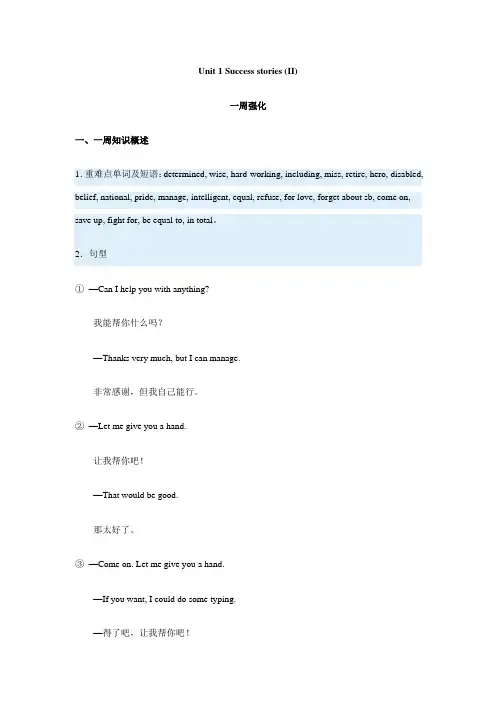
Unit 1 Success stories (II)一周强化一、一周知识概述1.重难点单词及短语:determined, wise, hard-working, including, miss, retire, hero, disabled, belief, national, pride, manage, intelligent, equal, refuse, for love, forget about sb, come on, save up, fight for, be equal to, in total。
2.句型①—Can I help you with anything?我能帮你什么吗?—Thanks very much, but I can manage.非常感谢,但我自己能行。
②—Let me give you a hand.让我帮你吧!—That would be good.那太好了。
③—Come on. Let me give you a hand.—If you want, I could do some typing.—得了吧,让我帮你吧!—假如你乐意,我可以打打字。
3.语言功能:学会表达提出、接受和拒绝帮助。
二、重难点知识讲解1.What does success mean to you?[译文]对你而言,成功意味着什么?mean to sb.表达“对某人来说……意味着……”,mean为动词。
e.g. Knowledge means wealth to us.知识对我们来说意味着财富。
此外,mean尚有一些其它的含义。
如下:(1)意思是。
e.g.The red light means“stop”.红灯表达停。
This signal means your message has been received.这个信号表达你发送的信息已经收到了。
(2)有……的征兆。
e.g.The dark clouds mean rain.这些乌云是下雨的征兆。
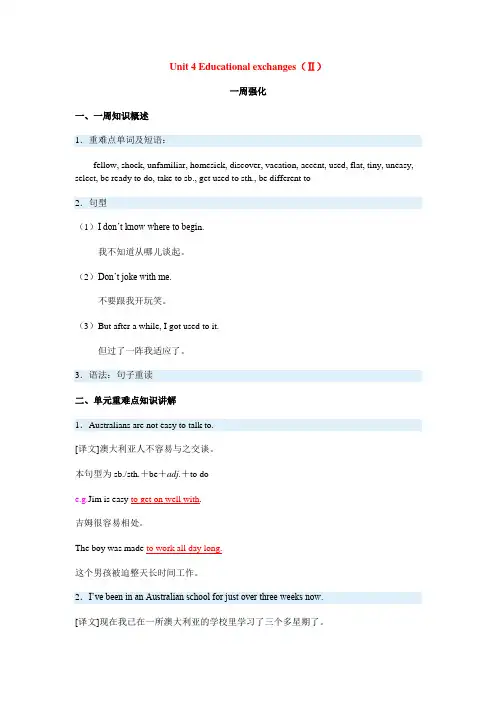
Unit 4 Educational exchanges(Ⅱ)一周强化一、一周知识概述1.重难点单词及短语:fellow, shock, unfamiliar, homesick, discover, vacation, accent, used, flat, tiny, uneasy, select, be ready to do, take to sb., get used to sth., be different to2.句型(1)I don’t know where to begi n.我不知道从哪儿谈起。
(2)Don’t joke with me.不要跟我开玩笑。
(3)But after a while, I got used to it.但过了一阵我适应了。
3.语法:句子重读二、单元重难点知识讲解1.Australians are not easy to talk to.[译文]澳大利亚人不容易与之交谈。
本句型为sb./sth.+be+adj.+to doe.g.Jim is easy to get on well with.吉姆很容易相处。
The boy was made to work all day long.这个男孩被迫整天长时间工作。
2.I’ve been in an Australian school for just over three weeks now.[译文]现在我已在一所澳大利亚的学校里学习了三个多星期了。
have been in后面通常加地点和时间,表示“某人在某地待了多长时间”,能表动作延续。
e.g.I have been in this school for ten years.我在这个学校10年了。
请大家注意have been to, have gone to与have been in这三个表达的区别。
have been to表示去过某地,现已返回原地;have gone to表示去了某地或已到达目的地,或在途中,总之现在未回来;have been in+地点+for+一段时间,表示在某地待了一段时间。
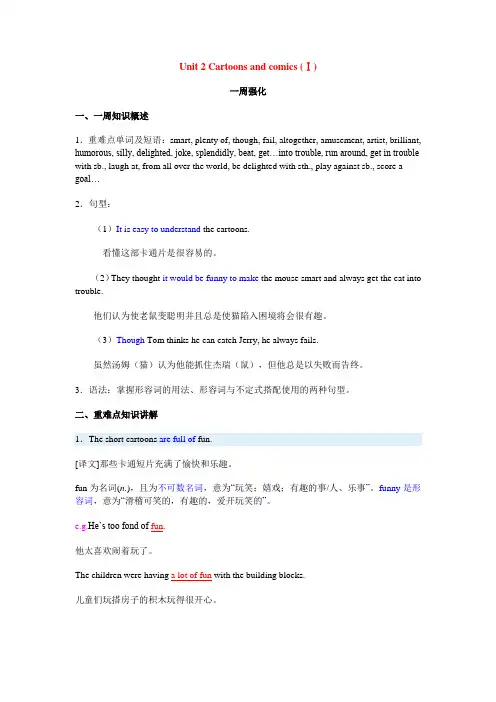
Unit 2 Cartoons and comics (Ⅰ)一周强化一、一周知识概述1.重难点单词及短语:smart, plenty of, though, fail, altogether, amusement, artist, brilliant, humorous, silly, delighted, joke, splendidly, beat, get…into trouble, run around, get in trouble with sb., laugh at, from all over the world, be delighted with sth., play against sb., score a goal…2.句型:(1)It is easy to understand the cartoons.看懂这部卡通片是很容易的。
(2)They thought it would be funny to make the mouse smart and always get the cat into trouble.他们认为使老鼠变聪明并且总是使猫陷入困境将会很有趣。
(3)Though Tom thinks he can catch Jerry, he always fails.虽然汤姆(猫)认为他能抓住杰瑞(鼠),但他总是以失败而告终。
3.语法:掌握形容词的用法、形容词与不定式搭配使用的两种句型。
二、重难点知识讲解1.The short cartoons are full of fun.[译文]那些卡通短片充满了愉快和乐趣。
fun为名词(n.),且为不可数名词,意为“玩笑;嬉戏;有趣的事/人、乐事”。
funny是形容词,意为“滑稽可笑的,有趣的,爱开玩笑的”。
e.g.He’s too fond of fun.他太喜欢闹着玩了。
The children were having a lot of fun with the building blocks.儿童们玩搭房子的积木玩得很开心。
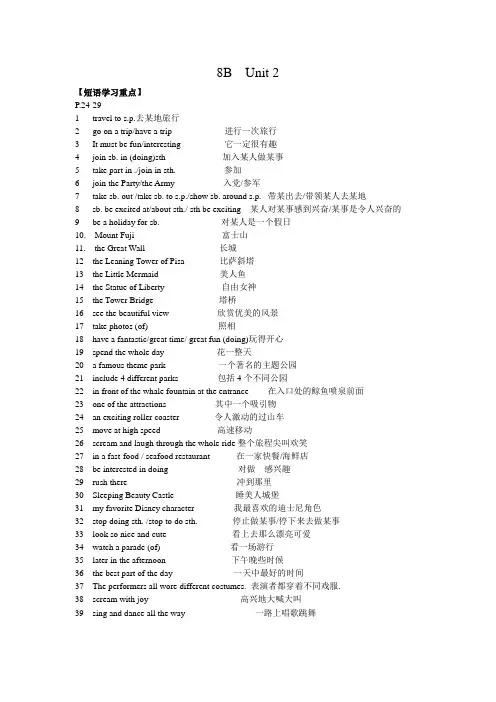
8B Unit 2【短语学习重点】P.24-291 travel to s.p.去某地旅行2 go on a trip/have a trip 进行一次旅行3 It must be fun/interesting 它一定很有趣4 join sb. in (doing)sth 加入某人做某事5 take part in ./join in sth. 参加6 join the Party/the Army 入党/参军7 take sb. out /take sb. to s.p./show sb. around s.p. 带某出去/带领某人去某地8 sb. be excited at/about sth./ sth be exciting 某人对某事感到兴奋/某事是令人兴奋的9 be a holiday for sb. 对某人是一个假日10. Mount Fuji 富士山11. the Great Wall 长城12 the Leaning Tower of Pisa 比萨斜塔13 the Little Mermaid 美人鱼14 the Statue of Liberty 自由女神15 the Tower Bridge 塔桥16 see the beautiful view 欣赏优美的风景17 take photos (of) 照相18 have a fantastic/great time/ great fun (doing)玩得开心19 spend the whole day 花一整天20 a famous theme park 一个著名的主题公园21 include 4 different parks 包括4个不同公园22 in front of the whale fountain at the entrance 在入口处的鲸鱼喷泉前面23 one of the attractions 其中一个吸引物24 an exciting roller coaster 令人激动的过山车25 move at high speed 高速移动26 scream and laugh through the whole ride整个旅程尖叫欢笑27 in a fast-food / seafood restaurant 在一家快餐/海鲜店28 be interested in doing 对做---感兴趣29 rush there 冲到那里30 Sleeping Beauty Castle 睡美人城堡31 my favorite Disney character 我最喜欢的迪士尼角色32 stop doing sth. /stop to do sth. 停止做某事/停下来去做某事33 look so nice and cute 看上去那么漂亮可爱34 watch a parade (of) 看一场游行35 later in the afternoon 下午晚些时候36 the best part of the day 一天中最好的时间37 The performers all wore different costumes. 表演者都穿着不同戏服.38 scream with joy 高兴地大喊大叫39 sing and dance all the way 一路上唱歌跳舞40 watch a 3-D film 看一场三D电影41 like magic 像魔术42 smell the apple pie and feel the wind 闻到苹果派,感受到风43 buy some souvenirs 买一些纪念品44 buy some stationery (as souvenirs) for my cousin 为我表兄买一些文具(作为纪念品)45 I am sure you will love it. 我相信你将喜欢它46 watch fireworks 观看烟火47 look shiny and beautiful under the fireworks 在烟火下看上去闪亮美丽48 in all 总共P.30-3349 It was hopeless to wait in the line. 排队等待没希望.50 at last /finally / in the end 最后51 get in 进入52 look great in the photos 在照片中看起来很好53 It seems that +clause Sb./sth seems +adj./n. / to do sth. 看来……54 watch an interesting TV programme 看一个有趣的电视节目55 celebrate their 15years of marriage庆祝结婚15周年56 for over two years 两年多57 since last year 自从去年以来P.34-3958 water sports 水上运动59 go hiking / skiing / sailing 去远足/去滑雪/航行60 in any season 在任何季节61 all year round 全年62 have some idea of 知道…..63 plan to travel abroad 计划去国外旅行64 go for a meeting 去开会65 hope to meet sb 希望迎接某人66 take a plane 乘飞机67 check it for you 为你核查68 three and a half hours 三个半小时69 at the beach 在海滩70 be quite different 相当不同71 on the third day 在第三天72 have a bird’s-eye view of 俯瞰73 a modern city of tall buildings with lights shining in the evening一个高楼林立,夜晚灯光闪亮的现代化城市74. the cultural center 文化中心75 a good place to go/buy things 一个去/买东西的好地方76 enjoy our trip to Hong Kong very much 非常喜欢去香港的旅行77 the day before yesterday 前天78 leave a book at home 把一本书落在家里79 have kept it for too long 已经借了太久80 wave to us with their trunks and ears 用它们的鼻子和耳朵向我们挥动81 It was fun to so many elephants marching看见这么多大象游行很有趣.82 forget this meaningful experience 忘记这次有意义的经历83 be harmful/harmless有/无害的84 at first 首先at last /finally / in the end最后【难点解析】1. It must be fun. 那一定会很有趣.Can it be fun? 那会有趣吗?It can’t be fun. 它不可能有趣。
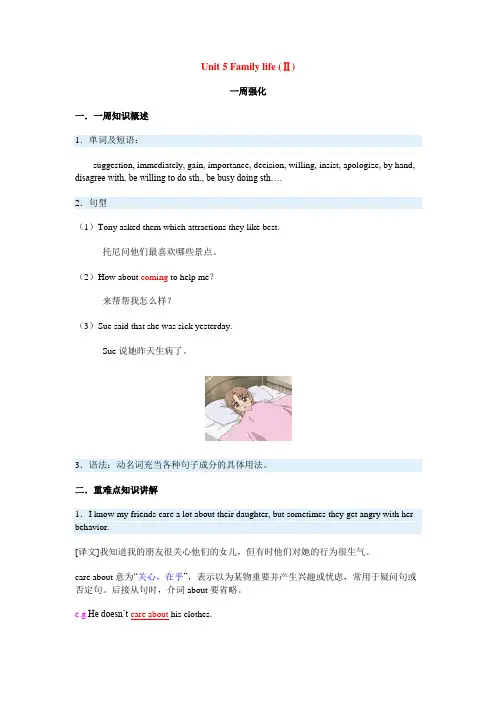
Unit 5 Family life (Ⅱ)一周强化一.一周知识概述1.单词及短语:suggestion, immediately, gain, importance, decision, willing, insist, apologize, by hand, disagree with, be willing to do sth., be busy doing sth….2.句型(1)Tony asked them which attractions they like best.托尼问他们最喜欢哪些景点。
(2)How about coming to help me?来帮帮我怎么样?(3)Sue said that she was sick yesterday.Sue说她昨天生病了。
3.语法:动名词充当各种句子成分的具体用法。
二.重难点知识讲解1.I know my friends care a lot about their daughter, but sometimes they get angry with her behavior.[译文]我知道我的朋友很关心他们的女儿,但有时他们对她的行为很生气。
care about意为“关心,在乎”,表示以为某物重要并产生兴趣或忧虑,常用于疑问句或否定句。
后接从句时,介词about要省略。
e.g.He doesn’t care about his clothes.他不讲究衣着。
We don’t care whether it rains.我们才不在乎下不下雨呢。
(1)take care of = look after,意为“照顾,爱护”。
e.g.Children are taken good care of.孩子们受到很好的照料。
在get angry这个短语中,get为系动词,相当于become或be, 意为“变得,成为”,常和形容词比较级连用,表示一个渐进的过程。
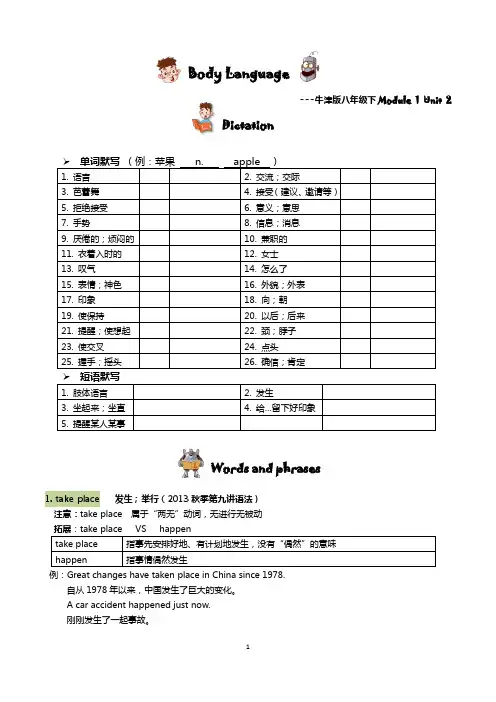
Body Language---牛津版八年级下Module 1 Unit 2DictationWords and phrases1. take place 发生;举行(2013秋季第九讲语法)注意:take place 属于“两无”动词,无进行无被动例:Great changes have taken place in China since 1978.自从1978年以来,中国发生了巨大的变化。
A car accident happened just now.刚刚发生了一起事故。
2. well-dressed adj. 穿着讲究的构词方法:well + dressed属于“well + 过去分词”的构词方法类似词组:well-known(众所周知的)well-educated(受过良好教育的)well-paid(报酬优厚的)well-chosen(精选的)拓展:dress的用法:①dress作及物动词时,后接人或反身代词,不接衣物,表示“为…穿衣服”,如dress oneself。
例:The mother bathed Joey and dressed her in clean clothes.妈妈给乔伊洗好澡,并给她穿上干净的衣服。
②dress up 盛装打扮例:Jimson dressed up as a frog.吉姆森打扮成了青蛙的样子。
③get dressed 穿好衣服例:Daisy’s mother made her get dressed and drove her to the school.黛西的妈妈让她穿好衣服,然后开车送她上学去了。
3. communicate communicating; communicated; communicated搭配:v. 交流;沟通(communicate…with…)例:It is necessary for young people to communicate with their parents.对于年轻人来说,和父母沟通是非常有必要的。
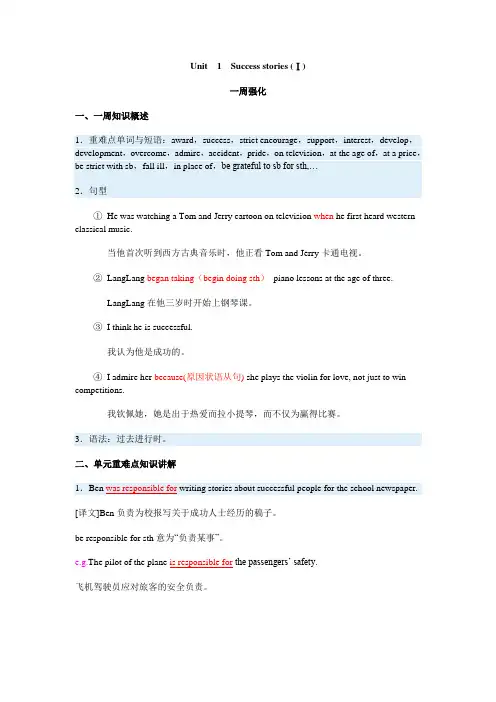
Unit1Success stories (Ⅰ)一周强化一、一周知识概述1.重难点单词与短语:award,success,strict encourage,support,interest,develop,development,overcome,admire,accident,pride,on television,at the age of,at a price,be strict with sb,fall ill,in place of,be grateful to sb for sth,…2.句型①He was watching a Tom and Jerry cartoon on television when he first heard western classical music.当他首次听到西方古典音乐时,他正看Tom and Jerry卡通电视。
②LangLang began taking(begin doing sth)piano lessons at the age of three.LangLang在他三岁时开始上钢琴课。
③I think he is successful.我认为他是成功的。
④I admire her because(原因状语从句) she plays the violin for love, not just to win competitions.我钦佩她,她是出于热爱而拉小提琴,而不仅为赢得比赛。
3.语法:过去进行时。
二、单元重难点知识讲解[译文]Ben负责为校报写关于成功人士经历的稿子。
be responsible for sth意为“负责某事”。
e.g.The pilot of the plane is responsible for the passengers’ safety.飞机驾驶员应对旅客的安全负责。
如果主语不是人,则表示造成事实的“原因”。

Unit 2 Cartoons and comics (Ⅰ)一周强化一、一周知识概述1.重难点单词及短语:smart, plenty of, though, fail, altogether, amusement, artist, brilliant, humorous, silly, delighted, joke, splendidly, beat, get…into trouble, run around, get in trouble with sb., laugh at, from all over the world, be delighted with sth., play against sb., score a goal…2.句型:(1)It is easy to understand the cartoons.看懂这部卡通片是很容易的。
(2)They thought it would be funny to make the mouse smart and always get the cat into trouble.他们认为使老鼠变聪明并且总是使猫陷入困境将会很有趣。
(3)Though Tom thinks he can catch Jerry, he always fails.虽然汤姆(猫)认为他能抓住杰瑞(鼠),但他总是以失败而告终。
3.语法:掌握形容词的用法、形容词与不定式搭配使用的两种句型。
二、重难点知识讲解1.The short cartoons are full of fun.[译文]那些卡通短片充满了愉快和乐趣。
fun为名词(n.),且为不可数名词,意为“玩笑;嬉戏;有趣的事/人、乐事”。
funny是形容词,意为“滑稽可笑的,有趣的,爱开玩笑的”。
e.g.He’s too fond of fun.他太喜欢闹着玩了。
The children were having a lot of fun with the building blocks.儿童们玩搭房子的积木玩得很开心。
Step 1:Welcome to the unitI show some pictures which were taken when I travelled once. Then I ask thestudents :Where was I? Do you like travelling? Then I say today we will talk about travelling, the tourist attractions in the world.一、Travelling n.意为“旅行”, 是不可数名词。
其动词的完全形式为travel. 泛指一般意义的旅行,即一般的旅行活动。
如:Travelling is much cheaper than it used to be. 旅行比过去便宜多了。
travel, trip, journey 的用法区别三者均可表示“旅行。
journey 通常指远距离的陆地旅行,并且不一定要返回到出发地(即通常指单程)。
如:I wish you a pleasant journey. 祝你一路顺风。
trip 通常指近距离的为了办事或消遣而进行旅行,并且往往要回到出发点(即指双程),不过有时trip 也可指远距离的长途旅行,可与journey 换用,比journey 更通俗。
如:1、A:Where is John?约翰在哪里?B:He’s on a trip to Shanghai. 他去上海旅行了。
2、He’ll make a round-the-world trip. 他将周游世界。
二、I’ve been there before.我以前去过那里。
have been to 意为“去过”,后面没有地点名词时,省略to.Have you ever been to Guangzhou? 你曾经去过广州吗?Jim has been there before. 杰姆以前去过那里。
八年级下册英语书笔记第二单元English: In the second unit of the eighth-grade English textbook, students delve into the theme of environmental protection and conservation. The unit starts by exploring the importance of preserving the environment and the impact of human activities on the planet. Students learn about various environmental issues such as pollution, deforestation, and habitat destruction, and they discuss the consequences of these problems on ecosystems and biodiversity. Additionally, they examine the concept of sustainability and how individuals can contribute to protecting the environment through small everyday actions. Throughout the unit, students engage in discussions, reading comprehension activities, and writing tasks focused on environmental topics, allowing them to develop a deeper understanding of the importance of environmental conservation and their role in promoting sustainability.中文翻译: 在八年级英语教科书的第二单元中,学生探讨了环境保护和保护的主题。
Unit1-2课文知识要点全复习一、单词(要求准确理解意思,一定要会拼写!注意部分词之间的辨别)Stunning, competition, event; performance; lightning conductor; detective; electricity; equipment & experiment; pavement; overcome; admire; admirable; underground; hard-working; curious; talented; intelligent; confident; brave; determined; last; Frame; outline; key重要的;terrible, horrible;二、短语One of the 最高级+名复be born in (+地点或时间)take piano lessonswin first prize& win many awards& win many medals;from now on, from then onbe strict with sbgive up & give in前者可作及物动词,后者只可不及物get one’s changefall illin place of sb代替某人的位置,instead of 代替另一件事,后一般加doingat huge event such as…be grateful to sbrequire sb to do sthon one’s own==by one selflead toa number of + 可数复名protect sth/sb from doinghave poor sightbe tired of doingat the same timebe known astravel across(across横穿,通过)a way to do sthanswer to questiona key to the doora way to某个地方set uphave a gift for sth/doinganyone else?national pridean example of successget ready to do=prepare for sthprepare sth for sbI can manage.save uplook for & find前者强调动作和过程,后者强调结果fight for为谁/什么而战& fight against与什么作战,反对be equal toin total=altogether=in all总共retire from从哪里退休fire火,解雇be regarded as被认为…be curious about sthTwo of the 最高级+名复be full of==be filled within the late 1930sa huge success=a great successmost of 名复plenty of+可复或不可(lots of和a lot of也可或不可)a number of+可复since自从,因为fail失败,fail to do 未能做altogether=all together=in all=in totalalmost几乎,almost not=hardly几乎不from all over the world=in the whole world; think of想起think over仔细考虑think about考虑make sure确定show/see/watch/hear/listen to+sb do/doingbe delighted/pleased/happy with sthscore a goalplay a trick on sbdate back to追溯到in really good condition状况非常好in existence存在whenever=no matter when无论何时however=no matter how无论如何whatever=no matter what无论什么knock sb down撞到in reply回答,答复三、句子1 Would you rathe r be rich or famous? I’d rather be both.2 Lang Lang’s story is much more interesting than this simple sentence.3 His success came at a price.4 His performance was a great success and his life was changed forever.5 He says he is grateful to his parents since they have always encouraged and supported him.6 强调句He did invent the lightning conductor. 动词前加助动词,动词还原成原型。
Unit 2 Cartoons and comics (Ⅰ)一周强化一、一周知识概述1.重难点单词及短语:smart, plenty of, though, fail, altogether, amusement, artist, brilliant, humorous, silly, delighted, joke, splendidly, beat, get…into trouble, run around, get in trouble with sb., laugh at, from all over the world, be delighted with sth., play against sb., score a goal…2.句型:(1)It is easy to understand the cartoons.看懂这部卡通片是很容易的。
(2)They thought it would be funny to make the mouse smart and always get the cat into trouble.他们认为使老鼠变聪明并且总是使猫陷入困境将会很有趣。
(3)Though Tom thinks he can catch Jerry, he always fails.虽然汤姆(猫)认为他能抓住杰瑞(鼠),但他总是以失败而告终。
3.语法:掌握形容词的用法、形容词与不定式搭配使用的两种句型。
二、重难点知识讲解1.The short cartoons are full of fun.[译文]那些卡通短片充满了愉快和乐趣。
fun为名词(n.),且为不可数名词,意为“玩笑;嬉戏;有趣的事/人、乐事”。
funny是形容词,意为“滑稽可笑的,有趣的,爱开玩笑的”。
e.g.He’s too fond of fun.他太喜欢闹着玩了。
The children were having a lot of fun with the building blocks.儿童们玩搭房子的积木玩得很开心。
What fun!多么有趣!Her baby is great fun.她的婴儿非常好玩。
Skating is good fun.滑冰很有趣。
另外,它还可构成固定词组make fun of sb.,意为“同某人开玩笑”。
e.g.He is angry. Don’t make fun of him.他生气了。
别同他开玩笑。
funny是形容词(adj.),意为“滑稽的,可笑的,好玩的,有趣的”。
e.g.a funny story好笑的故事Don’t be funny.别开玩笑。
2.William Hanna and Joseph Barbera both worked for MGM in the late 1930s.[译文]威廉·汉纳和约瑟夫·巴伯拉两人在20世纪30年代后期为MGM公司效力。
both表示“两者都”的含义,常用于be动词之后,实义动词之前。
e.g.His parents are(be动词)both teachers.他的父母都是老师。
The two boys both like(实义动词)drawing.两个男孩都喜欢画画。
另外,请注意both与all的区别,both是指两个人或两个物都……,用于两者,all是指三者或三者以上都……。
e.g.They both stood up when the teacher came in.当老师进来的时候,他们俩都站了起来。
The students in our class all went to the park yesterday.昨天我们班里的学生都去了公园。
They are all good students.他们都是好学生。
in the late 1930s是表达“时间”的一种方式,意为“二十世纪三十年代晚期”,那么“二十世纪三十年代早期”表达为in the early 1930s。
3.They thought it would be funny to make the mouse smart and always get the cat into trouble.[译文]他们认为使老鼠变聪明并且总是使猫陷入困境将会很有趣。
这是句型结构为:It+be+adj.+for sb. to do sth.的用法。
表示“(对某人来说)做某事是……的”的意义,其中it为形式主语,to do sth.即动词不定式短语才是真正的主语。
e.g.It’s necessary for us to get timely help around.在周围及时找到帮助对于我们来说很有必要。
It is important to make a plan for our future.为我们的未来制定计划很重要。
特别提示:It+be+adj.+for sb. to do sth.与It+be+adj.+of sb. to do sth.这两个句型相似性与差异。
不定式的逻辑主语用for还是of引出,关键看形容词,当形容词表示客观情况,描述不定式的特征、性质时常用for引出不定式的逻辑主语。
e.g.It is important for us to study a foreign language.掌握一门外语对于我们来说很重要。
It is very difficult for them to finish the task within so short a time.对他们来讲在这么短时间内完成这个任务是很艰巨的。
当形容词表示主观感情或态度,描述主语的性质、身份、特征时,常用of引出不定式的逻辑主语。
e.g.It is kind of you to help me.你帮助了我,你真是太好了。
类似的形容人的的形容词有:nice 好kind 和蔼cruel 残忍silly 傻good 好lazy 懒惰selfish 自私stupid 笨foolish 蠢wise 明智clever 聪明brave 勇敢honest 诚实right 正确wrong 错误rude 粗鲁polite 礼貌的careless 粗心careful 细心impolite 不礼貌make the mouse smart 使老鼠变聪明make表示“使”的含义,常构成make sb.e.g.The boss often makes him do too much work.老板经常让他干太多的工作。
We should try to make our country more beautiful.我们应当尽力去使我们的国家变得更美。
get…into trouble意为“使……陷入麻烦/困境”,它的反义词为get…out of trouble意为“使……摆脱麻烦/困境”。
e.g.Don’t get yourself into trouble.别把自己陷入难堪的境地。
She told a lie rather than get her friend into trouble.为了不使朋友有麻烦,她说了谎话。
Don’t mention my name or you’ll get me into trouble.别提我的名字,免得给我惹麻烦。
4.…, they made plenty of Tom and Jerry cartoons.[译文]……,他们制作了大量的《猫和老鼠》卡通片。
make是初中英语中出现频率很高的一个动词,它的用法主要有:(1)做,制作,制造e.g.She made a kite for her sister yesterday.昨天她为她妹妹做了一个风筝。
(2)铺(床)e.g.Please make your bed before breakfast.请在早饭前把床整理好。
(3)制定,规定e.g.They have made a study plan for this term.他们已经制定了本学期的学习计划。
(4)产生,引起(某事物)e.g.Don’t make any noise in class.上课时不要弄出噪音。
(5)使(某人/某物)成为,变为,变得e.g.The good news made her happy.这个好消息使她高兴。
(6)强迫、迫使(某人)做某事e.g.Nothing will make me change my mind.没有什么事能使我改变主意。
(7)选举(某人),指派e.g.We made Jack our monitor at the meeting yesterday.在昨天的会议上我们选杰克为班长。
plenty of意为“很多的,大量的,绰绰有余的”,可修饰可数名词及不可数名词,只用于陈述句,在疑问句中一般用enough,在否定句中用many或much。
注意:plenty of前面没有冠词a,不可误记成a plenty of。
e.g.There is plenty of time.时间充裕得很。
There are plenty of eggs in the basket.篮子里鸡蛋多得很。
5.It is easy to understand the cartoons, since there is usually no speaking in them.[译文]理解这些卡通片是很容易的,因为在片中经常没有语言。
这是It is+adj.+to do sth.结构,在此结构中,it作形式主语,不定式作真正的主语,如果要强调不定式动作的执行者,就在不定式前加for sb.,即It is+adj.+for sb.+to do sth.,形容词表示对整个不定式情况的一种客观陈述,说明不定式如何怎样,这种情况在前面第三个知识点已讲过。
不定式作主语时,也可直接将不定式放在句首作主语。
e.g. It is not easy to learn a foreign language.=To learn a foreign language isn’t easy.学会一门外语不容易。
It’s difficult to fall asleep.难以入睡。
It’s dangerous to swim in the river.在河里游泳很危险。
6.Instead, the two animals are always running around or fighting each other.[译文]相反,两只小动物总是到处追逐打闹。
instead意为“相反,代替,而不是”,instead of意为“取代,而不是”,有时两者可以变化互用。